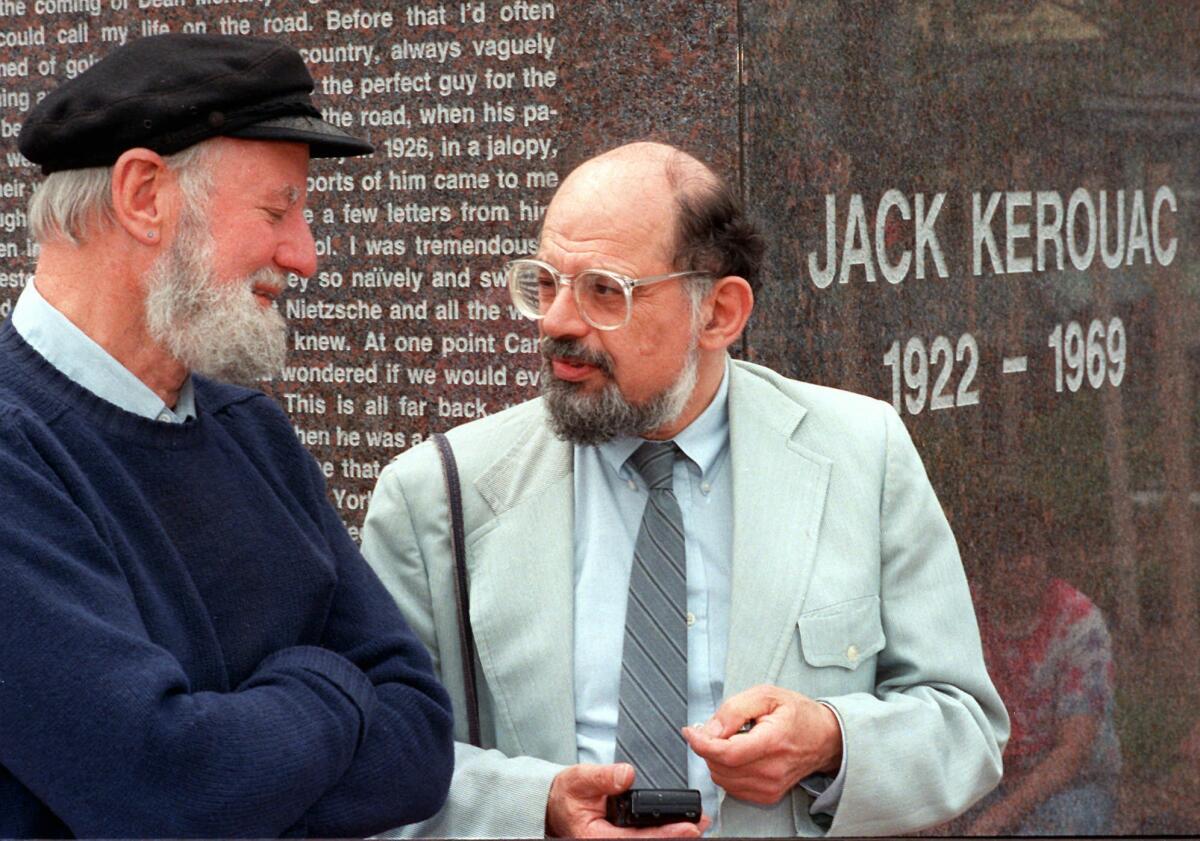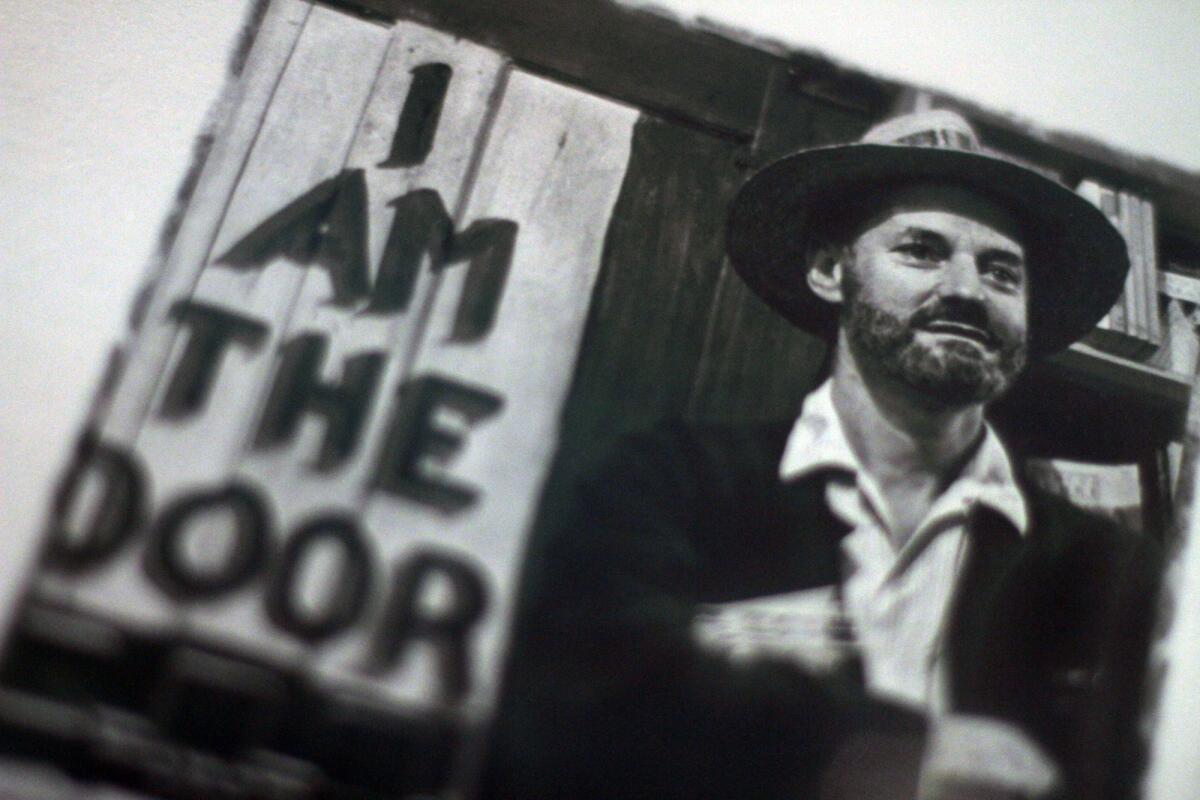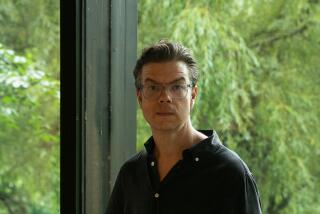Lawrence Ferlinghetti’s ‘Little Boy’ reveals his life before the San Francisco beat scene
- Share via
“Little Boy was quite lost. He had no idea who he was or where he had come from.” So begins Lawrence Ferlinghetti’s newest book, “Little Boy,” released just before the poet’s 100th birthday, later this month.
Though the book is ostensibly a “novel” — at least according to its cover — the titular “Little Boy” is clearly a version of Ferlinghetti himself. Thus, the first 15 pages read like a relatively straightforward memoir. We learn that Little Boy was shuffled around a number of homes in his youth. Just after he was born in New York, he was given by his mother to an aunt and taken to France to be raised by her and her husband. Before long he moved back to New York. Soon after, a “Health Department man” took him away from his home and left him in an orphanage. At some point, a rich, elderly couple in Bronxville finally took him in, though this wasn’t nearly the last of his “endless series of confusions transplantations transformations...” Next we find Little Boy became Grown Boy, who “came into his own voice and let loose his word-hoard pent up within him.”
If “Little Boy” is just a dream, then it’s one you can easily get lost in ... wandering one last time through the Coney Islands of an iconic poet’s mind.
The “word-hoard” that is thus “let loose” for the following 150 or so pages is not quite a novel nor a memoir. The book’s publisher rightly calls it an “unapologetically unclassifiable work.” It’s at once a novel, a memoir, a poem, a monologue, a psalm, a rant, a scientific treatise, a political address, a last will and testament, a mostly punctuation-free stream of consciousness — a shout into the maw of oblivion, a definitive capstone to a long and storied literary life.
Ferlinghetti, perhaps best known as the co-founder of City Lights Bookstore in San Francisco and the publisher of Allen Ginsberg’s infamous “Howl and Other Poems,” wrote a landmark collection of poetry himself in the late 1950s titled “A Coney Island of the Mind.” The collection went on to sell more than a million copies and remains one of the bestselling volumes of poetry published in the 20th century. In 1960, Ferlinghetti published “Her,” his first novel, which he called, “a surreal semi-autobiographical blackbook record of a semi-mad period of my life, in that mindless, timeless state most romantics pass through, confusing flesh madonnas with spiritual ones.”

“Little Boy,” published almost 60 years later, could be considered a companion piece to “Her.” It too reads like a surreal semi-autobiographical blackbook record of a semi-mad period, except here it’s a period in which a nonagenarian looks back on his life as his centenary looms over the horizon. There’s little else to compare the book to, aside from James Joyce’s “Finnegans Wake,” where language becomes confused with life, which becomes confused with dreams in a pool of “sublime babble,” or Conrad Aiken’s “Ushant,” another memoir-cum-unapologetically-unclassifiable-work that spirals the psyche of its elderly author and mines his history in an attempt to reach somewhere, something, somehow.

Ferlinghetti’s book is a torrent of textual splendor, where groan-worthy puns (“man and womban”) sit side by side with deep philosophical ruminations (“the most advanced science is the most poetic”), where planetary pessimism (“the unrushing fate of the whole human race which scientists predict will very soon perish, in the Sixth Extinction of life on this earth”) sidles up to romantic posturing (“I am glad I am a romantic and not a realist”), where pop culture references to “Star Wars” and John Wayne find themselves in dialogue with Ferlinghetti’s major literary touchstones, from Joyce to Beckett, Kerouac to Rimbaud, Eliot to Dante, Plato to Proust.
If the pages of “Little Boy” represent Ferlinghetti’s “remembrance of things past,” it is important to understand that he sees memory as “an hourglass when you turn it over and all the sands of past life flow down through it mixing recent grains of time with earlier grains all haphazard together in the mix.”
Everything Ferlinghetti has read, written, lived, experienced, thought and understood in his near-hundred-years on this planet has been tossed into the blender of his consciousness. “Little Boy” gives us the opportunity to watch as it all swirls in that blender, the blades slowly bringing all these disparate particles together into a more homogenous flow — everything connected, everything consequential, yet without direct plot or meaning (much like life itself).
Ferlinghetti’s book is a torrent of textual splendor.
The book’s whorl of words — allusive, uncanny, beautiful, ugly, profound, full of sound and fury, signifying nothing, signifying everything— is hard to turn away from because we realize we are in the presence of an elder who has earned his right to ramble. If this were the book of a younger man, the interest and impact would admittedly be less. As a deluge of memories and ruminations, it needs the distance and the lived experience of an aged poet.
In the more straightforward, early section of “Little Boy,” Ferlinghetti relays one childhood story that might clue us into what he’s attempting here. At boarding school, Little Boy’s roommate Jim “had Small Boy down on the floor, sitting on him astraddle. He was gentle but he would not let Small Boy up until he would admit that he could not prove he was alive and that he was not dreaming, and Small Boy kept crying ‘But I am alive, I am alive!’ and Jim kept saying how can you prove it.”
“Little Boy” simultaneously depicts that youngster and the old man that he became growing resigned to the fact that the memories of one’s life may be no different from dreams.
But if “Little Boy” is just a dream, then it’s one you can easily get lost in, and by the time you wake up, you won’t quite know what you did or where you went, but you’ll have felt as though you were able to touch another consciousness, if only for a brief moment, wandering one last time through the Coney Islands of an iconic poet’s mind.
::
Lawrence Ferlinghetti
Doubleday, 192 pp., $24
Malone is a writer based in Southern California. His work has appeared in Lapham’s Quarterly, Literary Hub, the LA Review of Books and elsewhere.
More to Read
Sign up for our Book Club newsletter
Get the latest news, events and more from the Los Angeles Times Book Club, and help us get L.A. reading and talking.
You may occasionally receive promotional content from the Los Angeles Times.







